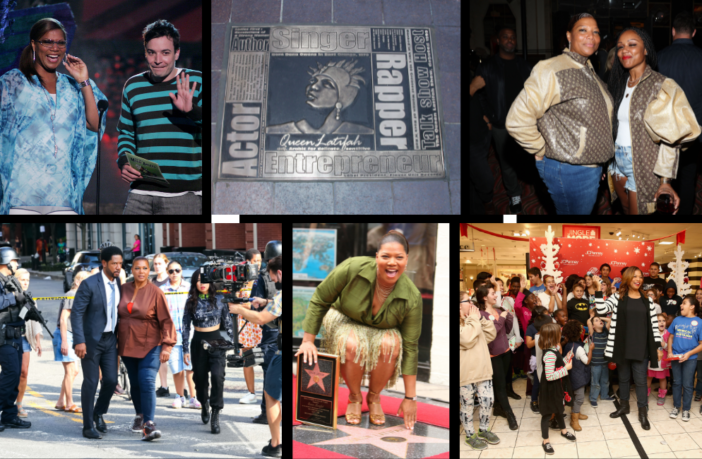By Sarah Mosqueda
We’ve had the prince of pop and the king of rock ‘n’ roll, but when it comes to hip-hop, there’s only one queen.
At the 2024 NAACP Image Awards, host Queen Latifah was surprised by her Living Single co-star, Erika Alexander, when she wished the 54-year-old powerhouse a happy birthday with a royal blue cake.
“We would be remiss if we didn’t celebrate you tonight, friend,” said Alexander. “For the light that you shine, for the trails that you blazed, for the empowerment that you instill; happy birthday, Queen.”
Hosting the 55th annual NAACP Image Awards is just one of the many things Latifah has been up to lately, and her former co-star’s words couldn’t ring truer for the American rapper, actress, producer, singer and ally who continues to shine and empower.
Taking a Beat
Latifah’s career as a musician began in the late 1980s. Hailing from Newark, New Jersey, her given name is Dana Elaine Owens, but she came up with the stage name Queen Latifah when she was just eight years old. She discovered the word “Latifah” and its meaning of “delicate” or “very kind” in a book of Arabic names.
At the age of 18, she started beatboxing with a group called Ladies Fresh and was also an original member of the Flavor Unit. Producer DJ King Gemini passed her demo along to MTV, and she was signed to Tommy Boy Records shortly after, who produced her first album, All Hail the Queen, in 1989. The debut reached the number six spot on the Billboard Top Hip-Hop/R&B Albums chart. She was just 19 years old.
All Hail the Queen, and particularly the track “Ladies First,” would have a long-lasting cultural impact on women in hip-hop and beyond. On a recent appearance on the Drew Barrymore Show, Latifah recalled how she found her voice on that first record.
“You have to find your lane, and my lane, I decided, was to definitely make women feel empowered; make us feel empowered,” said Latifah. “Why don’t I pump us up? Ladies first, how about that?”
“Ladies First” also opened doors for other women in the industry by featuring Monie Love, making it the first collaborative track by two female rappers not in a group. In 2008, the popular single placed at number 35 on VH1’s 100 Greatest Songs of Hip-Hop.
In 2023, “All Hail the Queen” was inducted into the Library of Congress’s National Recording Registry for its “cultural, historical or aesthetic importance in the nation’s recorded sound heritage.” The album not only proved rap had the ability to cross genres, but created more opportunities for women in hip-hop.
Latifah followed with her subsequent albums, Nature of a Sista’ in 1991 and Black Reign in 1993, which included the GRAMMY Award-winning song “U.N.I.T.Y.” After she released her fourth hip-hop album, Order in the Court, in 1998, she transitioned into traditional singing and released The Dana Owens Album, full of soul and jazz standards.
Life in Rhythm
While she was making music, Latifah was also launching her acting career. In the early 90s, she had supporting roles in films like House Party 2, starring Kid ‘n Play and Spike Lee’s Jungle Fever. Latifah also had guest roles on hit television series like The Fresh Prince of Bel-Air and Hangin’ with Mr. Cooper.
These minor roles led to her biggest yet—playing Khadijah James on FOX network’s Living Single. Latifah played the role of James from 1993 to 1998 and even wrote and produced the sitcom’s theme song.
Her movie roles continued, and she added box office hits like Set It Off and The Bone Collector to her filmography. In 2002, she combined her singing and acting talents in her role as Matron “Mama” Morton in Chicago. She received an Academy Award nomination for the role and joined a short list of other hip-hop and R&B artists with the distinction that includes Will Smith, Jennifer Hudson, Jamie Foxx and Mary J. Blige.
In 2007, Latifah added a new distinction to her repertoire: producer. She produced the film The Perfect Holiday and served as an executive producer for the third season of the Scream television series. In 2021, CBS rebooted the American crime drama The Equalizer, where Latifah serves as an executive producer and stars as the titular character. The show is now in its fourth season.
On a recent appearance on The Tonight Show with Jimmy Fallon, Latifah talked about the fight scenes she performs on The Equalizer and how she relates the skills to music. “Everything I do, music sort of informs it, so learning stunt choreography is like learning the beats of choreography; the rhythm of it,” she said.
A Positive Ally
While Latifah found her rhythm in the entertainment industry, questions regarding her sexual orientation always followed the star, who chose to keep the matter private early in her career. She famously spoke about the speculations around her personal life in The New York Times in 2008, saying, “I don’t have a problem discussing the topic of somebody being gay, but I do have a problem discussing my personal life,” she said. “You don’t get that part of me. Sorry.”
Despite remaining ambiguous about her own sexuality, Latifah never shied away from supporting others in the LGBTQ+ community.
Her role as Cleopatra Sims, a lesbian bank robber, in 1996’s Set It Off made her somewhat of a gay icon. In 2012, she headlined California’s annual Long Beach Pride Festival. Then, in 2021, Latifah received BET’s Lifetime Achievement Award. The award celebrated her long career as an actress and musician and the cultural impact she has had on the entertainment industry as a whole.
During her acceptance speech, she thanked her “sisters in the name of rap” and her friends and family. She ended her powerful speech with a shout-out to her partner Eboni Nichols and son Rebel; the first time she publicly confirmed her relationship.
“Eboni, my love. Rebel, my love. Peace. Happy Pride!” Latifah said.
Another topic Latifah has never shied away from is body image. From the start of her career, she celebrated Afro-centric Queendom to challenge Euro-centric beauty standards. In 2023, she partnered with It’s Bigger Than Me—a campaign aimed at not only helping people who are obese receive inclusive, compassionate care, but also educating doctors on best practices involving patients with obesity.
“Sixty-six percent of people with obesity have felt weight stigma from doctors,” Latifah told People Magazine. “We want to make sure people receive care that’s compassionate, safe and respectful.”
Latifah has also emphasized her disinterest in taking on roles that require her to lose weight in an unhealthy way, crediting her parents for helping her cultivate a positive self-image since childhood. It’s a sense of self-esteem the star still carries to this day.
“Health is most important to me. It’s not about losing weight or gaining weight,” Latifah continued. “If I have to do something that is going to be completely unhealthy for me, then that’s not the job for me.”
Still Reigning
Latifah’s trailblazing in the music, television and film industries and the path she has paved for the LGBTQ+ community and body positivity has not gone unnoticed. In 2006, she became the first hip-hop artist with a star on the Hollywood Walk of Fame and was awarded an honorary Doctor of Fine Arts degree by Rutgers University. She has won a GRAMMY Award, a Golden Globe Award, two Screen Actors Guild Awards and one Primetime Emmy Award. In 2023, Latifah was the first female rapper to be honored at the Kennedy Center Honors for her lifetime of contributions to American culture in the performing arts.
Most recently, the hip-hop icon has been developing the Queen Collective, a pipeline for women and non-binary filmmakers of color in both the film and advertising industries. The organization partners with Procter & Gamble, Flavor Unit Entertainment and Tribeca Studios and hopes to accelerate gender and racial equality behind the camera by opening doors for multicultural women creators. Its impact is already being felt, as the Queen Collective released six new films in 2022 alone.
Latifah is also passing the mic with her other project, the “Unity in the Community” podcast. The podcast highlights local unsung changemakers in their communities. Episodes have featured community leaders like educator and community activist Dr. Rashida Govan, the founder of New Orleans-based nonprofit Project Butterfly, and Walter Green, a restaurateur based in Latifah’s hometown of Newark, New Jersey who is working to combat food insecurity in the community.
The undisputed queen of hip-hop is still ruling as a woman boss and powerhouse. She credits her success to the music that started it all.
“I thank God for hip-hop music because if it weren’t for hip-hop music, I wouldn’t be here, and I don’t know if those doors would have opened to create this path,” Latifah said.
Explore more articles for the Black Community here.



